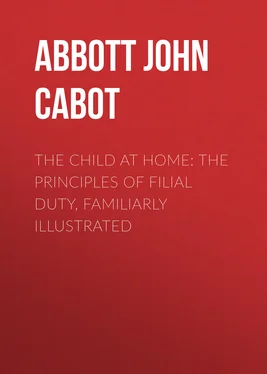John Abbott - The Child at Home - The Principles of Filial Duty, Familiarly Illustrated
Здесь есть возможность читать онлайн «John Abbott - The Child at Home - The Principles of Filial Duty, Familiarly Illustrated» — ознакомительный отрывок электронной книги совершенно бесплатно, а после прочтения отрывка купить полную версию. В некоторых случаях можно слушать аудио, скачать через торрент в формате fb2 и присутствует краткое содержание. Жанр: foreign_prose, foreign_edu, foreign_antique, на английском языке. Описание произведения, (предисловие) а так же отзывы посетителей доступны на портале библиотеки ЛибКат.
- Название:The Child at Home: The Principles of Filial Duty, Familiarly Illustrated
- Автор:
- Жанр:
- Год:неизвестен
- ISBN:нет данных
- Рейтинг книги:4 / 5. Голосов: 1
-
Избранное:Добавить в избранное
- Отзывы:
-
Ваша оценка:
- 80
- 1
- 2
- 3
- 4
- 5
The Child at Home: The Principles of Filial Duty, Familiarly Illustrated: краткое содержание, описание и аннотация
Предлагаем к чтению аннотацию, описание, краткое содержание или предисловие (зависит от того, что написал сам автор книги «The Child at Home: The Principles of Filial Duty, Familiarly Illustrated»). Если вы не нашли необходимую информацию о книге — напишите в комментариях, мы постараемся отыскать её.
The Child at Home: The Principles of Filial Duty, Familiarly Illustrated — читать онлайн ознакомительный отрывок
Ниже представлен текст книги, разбитый по страницам. Система сохранения места последней прочитанной страницы, позволяет с удобством читать онлайн бесплатно книгу «The Child at Home: The Principles of Filial Duty, Familiarly Illustrated», без необходимости каждый раз заново искать на чём Вы остановились. Поставьте закладку, и сможете в любой момент перейти на страницу, на которой закончили чтение.
Интервал:
Закладка:
There was a little girl eleven years of age, who died a few months ago. She loved the Savior, and when told that she could not live, was very happy. She said she was happy to die, and go home and be with her Savior and the angels in heaven. But there was one thing, which, for a time, weighed heavily upon her mind. A year or two before she felt interested in religion she had told a lie to her aunt; and she could not die in peace, till she had seen that aunt, confessed her sin, and asked forgiveness. Her aunt was sent for, though she was many miles distant. When her aunt came, the sick little girl, with sorrow for her fault, made confession, and asked forgiveness, "Aunt," said she, "I have prayed to God, and hope that he has forgiven me; and I cannot die in peace till I have obtained your forgiveness." If any child who reads this book is tempted to deceive his parents or his friends, I hope he will remember that he must soon die, and think how he will feel in that solemn hour.
But perhaps you think that the falsehood of which this girl was guilty was one of peculiar aggravation. It was simply this: She was one day playing in the room with several little children, and was making them laugh very loud. Her aunt said, "My dear, you must not make them laugh so loud."
And she replied, "It is not I, aunt, who makes them laugh."
This was the falsehood she uttered. And though her aunt did not know that it was false, the little girl did, and God in heaven did. And when she came to die, though it was a year or two after, her soul was troubled, and the consciousness of her sin destroyed her peace. A lie is, in the sight of God, a dreadful sin, be it ever so trifling in our estimation. When we are just ready to leave the world, and to appear before God in judgment, the convictions of a guilty conscience will press upon the heart like lead.
There are many ways of being guilty of falsehood without uttering the lie direct in words. Whenever you try to deceive your parents, in doing that which you know they disapprove, you do, in reality, tell a lie. Conscience reproves you for falsehood. Once, when I was in company, as the plate of cake was passed round, a little boy, who sat by the side of his mother, took a much larger piece than he knew she would allow him to have. She happened, for the moment, to be looking away, and he broke a small piece off and covered the rest in his lap with his handkerchief. When his mother looked, she saw the small piece, and supposed he had taken no more. He intended to deceive her. His mother has never found out what he did. But God saw him, and frowned upon him, as he committed this sin. And do you not think that the boy has already suffered for it? Must he not feel mean and contemptible whenever he thinks that, merely to get a little bit of cake, he would deceive his kind mother? If that little boy had one particle of honorable or generous feeling remaining in his bosom, he would feel reproached and unhappy whenever he thought of his meanness. If he was already dead to shame, it would show that he had by previous deceit acquired this character. And can any one love or esteem a child who has become so degraded? And can a child, who is neither beloved nor respected, be happy? No! You may depend upon it, that when you see a person guilty of such deceit, he does in some way or other, even in this world, suffer a severe penalty. A frank and open-hearted child is the only happy child. Deception, however skilfully it may be practised, is disgraceful, and ensures sorrow and contempt. If you would have the approbation of your own conscience, and the approval of friends, never do that which you shall desire to have concealed. Always be open as the day. Be above deceit, and then you will have nothing to fear. There is something delightful in the magnanimity of a perfectly sincere and honest child. No person can look upon such a one without affection. You are sure of friends, and your prospects of earthly usefulness and happiness are bright.
But we must not forget that there is a day of most solemn judgment near at hand. When you die, your body will be wrapped in the shroud, and placed in the coffin, and buried in the grave; and there it will remain and moulder to the dust, while the snows of unnumbered winters, and the tempests of unnumbered summers, shall rest upon the cold earth which covers you. But your spirit will not be there. Far away, beyond the cloudless skies, and blazing suns, and twinkling stars, it will have gone to judgment. How awful must be the scene which will open before you, as you enter the eternal world! You will see the throne of God: how bright, how glorious, will it burst upon your sight! You will see God the Savior seated upon that majestic throne. Angels, in numbers more than can be counted, will fill the universe with their glittering wings, and their rapturous songs. Oh, what a scene to behold! And then you will stand in the presence of this countless throng to answer for every thing you have done while you lived. Every action and every thought of your life will then be fresh in your mind. You know it is written in the Bible, "God will bring every work into judgment, with every secret thing, whether it be good or whether it be evil." How must the child then feel who has been guilty of falsehood and deception, and has it then all brought to light! No liar can enter the kingdom of heaven. Oh, how dreadful must be the confusion and shame with which the deceitful child will then be overwhelmed! The angels will all see your sin and your disgrace. And do you think they will wish to have a liar enter heaven, to be associated with them? No! They must turn from you with disgust. The Savior will look upon you in his displeasure. Conscience will rend your soul. And you must hear the awful sentence, "Depart from me, into everlasting fire, prepared for the devil and his angels." Oh, it is a dreadful thing to practice deceit. It will shut you from heaven. It will confine you in eternal wo. Though you should escape detection as long as you live; though you should die, and your falsehood not be discovered, the time will soon come when it will all be brought to light, and when the whole universe of men and of angels will be witnesses of your shame. If any child who reads this feels condemned for past deception, oh, beware, and do not postpone repentance till the day of judgment shall arrive. Go at once to those whom you have deceived, and make confession, and implore forgiveness. Then go to your Savior, fall upon your knees before him; pray that he will pardon you, and promise to sin no more. If your prayer is offered in sincerity, and your resolution remains unbroken, the Savior will forgive you; and when the trump of the archangel shall summon you to judgment, he will give you a home in heaven. The tear of sincere penitence our kind Saviour is ever ready to accept.
If you are ever tempted to deceive, O, remember, that your deception must soon be known. It is utterly impossible that it should long remain undetected. The moment the day of judgment arrives, your heart will be open to the view of the universe, and every thought will be publicly known. How much safer then is it to be sincere and honest! Strive to preserve your heart free from guile. Then you will have peace of conscience. You will fear no detection. You can lie down at night in peace. You can awake in the morning with joy. Trusting in the Saviour for acceptance, you can die happy. And when the morning of the resurrection dawns upon you, your heart will be filled with a joy which earth's sunniest mornings and brightest skies never could afford. The Saviour will smile upon you. Angels will welcome you to heaven. You will rove, in inexpressible delight, through the green pastures of that blissful abode. You will lie down by the still waters where there is sweet repose for ever. Oh, what an hour of bliss must that be, when the child, saved from sin and sorrow,
Читать дальшеИнтервал:
Закладка:
Похожие книги на «The Child at Home: The Principles of Filial Duty, Familiarly Illustrated»
Представляем Вашему вниманию похожие книги на «The Child at Home: The Principles of Filial Duty, Familiarly Illustrated» списком для выбора. Мы отобрали схожую по названию и смыслу литературу в надежде предоставить читателям больше вариантов отыскать новые, интересные, ещё непрочитанные произведения.
Обсуждение, отзывы о книге «The Child at Home: The Principles of Filial Duty, Familiarly Illustrated» и просто собственные мнения читателей. Оставьте ваши комментарии, напишите, что Вы думаете о произведении, его смысле или главных героях. Укажите что конкретно понравилось, а что нет, и почему Вы так считаете.












